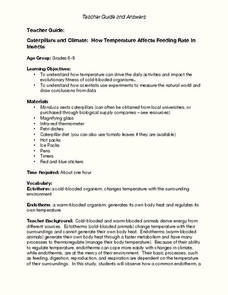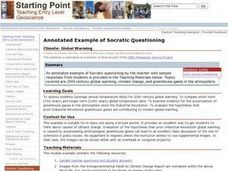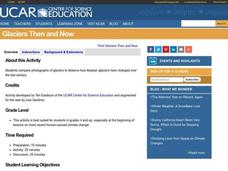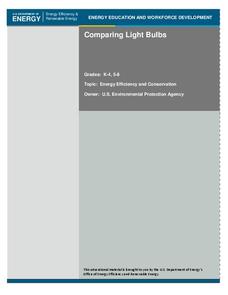Curated OER
Potential Consequences of Climate Variability and Change
Students examine the potential impact of climate change to agriculture, coastal areas, forests, water, and human health. They hypothesize what might happen to a sugar maple forest and hold a debate about global warming.
Curated OER
World Geography: Climate Change Round Table
Students are able to explain the suspected causes of relatively recent climate changes, specifically the observed global warming. They discuss how unusual or extreme global warming disrupts the balance of the earth's geo-spheres.
Chicago Botanic Garden
Are Global CO2 Levels Changing?
According to the Mauna Loa observatory, carbon dioxide levels increased by 3 ppm in our atmosphere between 2015–2016. Individuals analyze carbon dioxide data from around the world and then share this with a home group in lesson three of...
Curated OER
Caterpillars and Climate: How Temperature Affects Feeding Rate In Insects
Do you eat more when you are hot or when you are cold? Young scientists observe the eating pace of two caterpillars at different temperatures. The differences in endotherm and ecotherm animals' ability to adjust to temperature change...
British Council
How Green Are You?
Go green! Scholars survey their classmates to determine how green they are and then write a report to summarize their findings. Finally, pupils agree on five changes they can make in their lives to help the environment.
Curated OER
Annotated Example of Socratic Questioning: Climate: Global Warming
High schoolers compare and discuss short-term and longer-term global temperature data. They evaluate data from three sets of graphs and then participate in a structured whole class Socratic discussion on the possible causes of climate...
NASA
Wetlands
Take a little wade in the wetlands. A fun unit has pupils conduct a literature review to learn how climate change and human actions affect wetland ecosystems. They take a trip to a wetland, observe the fauna and flora, and then take and...
Curated OER
Write On!
Help empower your class by learning about the editorial section of the newspaper. They will have the option to also write to a politician. The goal is to teach students how to speak-up and express their opinions on important issues....
Curated OER
Hedgerows
Hedgerows prevent soil erosion, capture pollutants running off fields, store carbon to help combat climate change, and provide homes for predators of many pest species. The biodiversity lesson begins with an activity that discusses why...
NOAA
Stressed Out!
Are our oceans really suffering due to the choices humans make? The sixth and final installment in the volume of activities challenges research groups to tackle one of six major topics that impact ocean health. After getting to the...
Will Steger Foundation
The Carbon Cycle - What are its Implications for Climate Policy?
The carbon cycle isn't a bike which produces carbon and this lesson explains why. Through reading and discussion, groups of pupils create visual explanations of the four parts of the carbon dioxide oxygen cycle. Activities...
Center Science Education
Glaciers: Then and Now
Cooperative groups compare pairs of photos of Alaskan glaciers. They match a historical photo to the recent photo of the same glacier. The class discusses what conditions are necessary for glaciers to retreat. This abbreviated activity...
Chicago Botanic Garden
Carbon, Greenhouse Gases, and Climate
Climate models mathematically represent the interactions of the atmosphere, oceans, land, sun, surface, and ice. Part two in the series of four lessons looks at the role greenhouse gases play in keeping Earth warm and has participants...
Beyond Benign
The Big Melt: Arctic Ice Caps
Are the Arctic ice caps really melting out of existence? Junior climatologists examine the statistics of ice decline through four math-based lessons. Each activity incorporates data, climate information, and environmental impact into an...
Montana State University
Climb into Action!
Climate change affects even the largest and intimidating of landforms—even Mount Everest! A resource helps teach learners the connection between global climate change and its effects on Earth. Activities include videos, class discussion,...
Towson University
Looking Backwards, Looking Forward
How do scientists know what Earth's climate was like millions of years ago? Young environmental scholars discover how researchers used proxy data to determine the conditions present before written record. Grouped pupils gain experience...
Curated OER
Current Weather
A great year around activity that shows young mathematicians how the math skills they are learning are actually used in the real world. This exercise also helps learners begin to distinguish the difference between weather and climate. As...
Government of South Australia
Don't Waste Your Energy
Don't lift another finger, this physical and environmental science unit has everything you need to begin teaching your class about energy. Starting with a look at the greenhouse effect, these lessons and activities take young scientists...
Chicago Botanic Garden
Albedo, Reflectivity, and Absorption
What is reflectivity, and what does it have to do with the Earth's climate? As reflectivity is measured by albedo, scientists can gather information on Earth's energy balances that relate to global warming or climate change. Budding...
Chicago Botanic Garden
Plant Phenology Data Analysis
Scientists monitor seasonal changes in plants to better understand their responses to climate change, in turn allowing them to make predictions regarding the future. The last activity in the series of six has scholars analyze BudBurst...
It's About Time
Orbits and Effects
What does your world revolve around? Challenge the class as they learn about orbits and the effects of them on our modern world. Young astronomers begin by measuring ellipses and calculating the eccentricity of Earth's orbit. Then, they...
Curated OER
Comparing Light Bulbs
An average home produces twice as many emissions as an average car. Teach your class how to reduce energy consumption by replacing standard incandescent light bulbs with compact fluorescent light bulbs. Perform an experiment to compare...
Earth Day Network
Healthy Earth, Sick Earth
Earth is sick and needs our help! Read the children's book Planet Earth Gets Well to explain the various problems facing the planet, discussing what young conservationists can do to heal the planet along the way. A great Earth Day...
Global Oneness Project
A Vanishing Island
The effects of rising sea levels on Isle de Jean Charles, located off the coast of Louisiana, are documented in Emmanuel Vaughan-Lee's poignant short video. Viewers are asked to consider not only the plight of residents but also what...

























